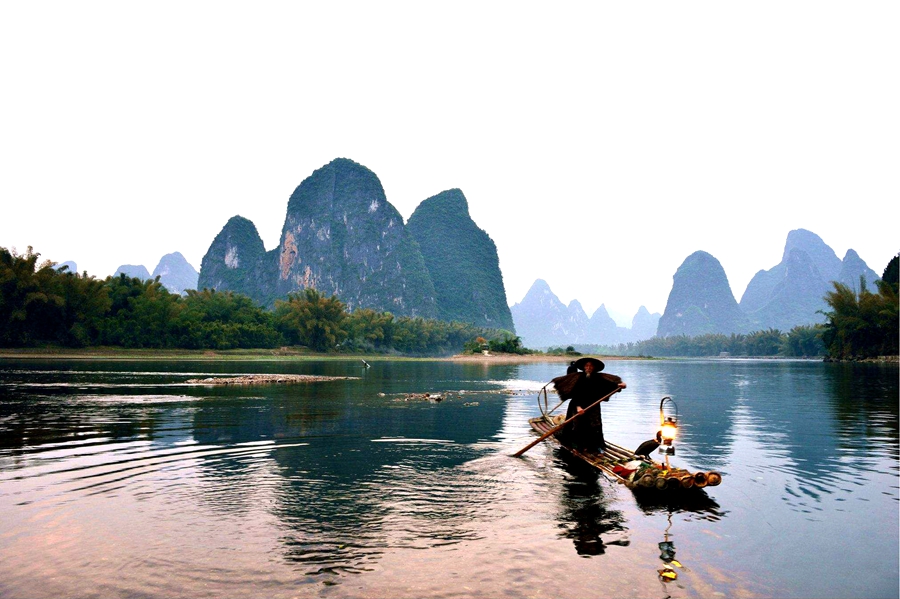Top destinations in China? Tang Dynasty Music and Dance Show For most first time visitors, it is a pleasant surprise that you won’t find yourselves lonely when night falls in the ancient city of Xian. The major avenues of Xi’an like Xi Dajie, Nan Dajie and Dong Dajie are brightly and beautifully lit lined with luminous neon signs stores. If you are not interested in the street evening shopping, then the Big Wild Goose Pagoda Square and Nanhu Lake are the favorite night hangouts, where the dazzling lights and beautiful scenery will surely shock you! Is this Xian? Yes, it is! If you prefer a night performance to kill your night time, Tang Dynasty Show is your best choice. Tang Dynasty Music and Dance Show is an outstanding element of this ancient rich and prosperous society, giving an insight into the peaceful life style of the Tang Dynasty (618 – 907).
This historic clock tower, which was constructed in 1915 as part of the now sadly demoilished Kowloon-Canton Railway terminus, is one of the most well-known buildings in Tsim Sha Tsui. This 44-metre high redbrick and granite tower is a declared monument, and is a relic from the days of British rule. Also, with Victoria Harbour in the background, it’s a pretty damn good photo opportunity too.
China is an awesome location if you are looking for ancient history mixed with modern attractions exploration. The town of Guilin, in the northeast corner of Guangxi, boasts some of China’s most beautiful countryside and is famous for the Li River, which meander through the town and surrounding karst mountains. While for hundreds of years this unique scenery has attracted poets and artists and has been the subject of countless fairy tales and legends, these days it’s popular with tourists from around the world wanting to see this natural splendor up close. The best way to enjoy the area is to take a cruise along the Li River. The most popular stretch is from Guilin to Yangshuo, where the river meanders peacefully through some 80 kilometers of remarkable rock formations and caves with romantic names such as the Mount of Unique Beauty, Elephant Trunk Hill, and Reed Flute Cave. Depending upon the type of boat used — you can choose from a tourist cruise ship to small bamboo punts — trips can take anywhere from a few hours to multiple days. See extra info at China silk road tour.
Erected mostly in the early 20th century, the fortress towers at Kaiping were built by famously outbound Kaipingers, who brought home the many architectural styles they saw abroad, including Islamic, Roman and even ancient Greek. The towers were built as a display of wealth, and as a practical way of protecting locals from war and theft. Approximately 1,800 fortress towers still stand amid Kaiping’s vast rice fields. Kaiping is located 130 kilometers southwest of Guangzhou, the provincial capital of Guangdong. Regular buses are available between Kaiping Bus Terminal and various long-distance bus terminals in Guangzhou. Direct buses and ferries are available between Kaiping and Hong Kong.
Originally built by King Songtsen Gampo in the seventh century, the awe-inspiring Potala Palace, perched high above much of Lhasa, is the landmark of the city. Built against the Red Hill, Potala Palace is a spectacular castle-like building complex of Lhasa, which is used to be the unification centre of political and religious of Tibet. Covered an area of over 360,000 square meters, it is a great palace of art with creative designing and gorgeous decoration. Its conservative religious atmosphere, precious scriptures, murals, jewels and antiques housed inside, earning it a place on UNESCO World Cultural Heritage Site list.
The Yungang Caves or Grottoes at Datong is one of the great examples of early Buddhist cave art. Here, monks carved more than 51,000 statues, ranging in size from several inches to tens of feet high into the hillside. Work on the carvings in the 252 grottoes took place in the fifth and sixth centuries. If possible, visitors recommend coming here in off-season when it is less crowded. One of the main reasons to visit Hangzhou, capital of Zhejiang Province, is to see West Lake, a large freshwater lake that is the symbol of this East China city. Forested man-made islands with temples and pagodas dot the lake, which is rarely deeper than five feet. West Lake, considered one of the most beautiful lakes in China, is divided into smaller lakes. It was once an imperial retreat. Discover more details at here.
